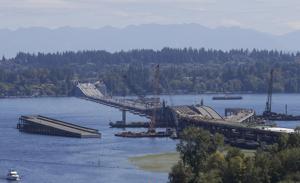Washington passes downsized $11.8 billion transportation budget lowering gas tax hike

(The Center Square) – Washington drivers will pay the third-highest gas tax in the nation after the passage of an $11.8 billion transportation plan by state lawmakers.
The two-year budget stems from an 11th-hour deal made between House and Senate Democrats over the weekend. It succeeds two plans from Sen. Steve Hobbs, D-Lake Stevens, and Rep. Jake Fey, D-Tacoma. The first, Forward Washington, increased the state’s 49.8-cent gas tax up to 59.3 cents by July – the second-highest gas tax in the country behind California. The second, Miles Ahead, raised it to 67.8 cents, placing it as the number one in the nation.
The two proposals stem from four transportation plans put forth last winter. The other two, from Sen. Curtis King, R-Yakima, and Sen. Rebecca Saldaña, D-Seattle, would have raised the gas tax by only 3 cents, spending less on road projects to avoid tax increases. Saldaña’s plan spent the most on green energy investments and included carbon fees.
The state gas tax will see a 5-cent increase this summer under a cap-and-trade bill that passed the Washington Legislature on Sunday after lawmakers disentangled it from the final transportation plan late Friday. Washington joined California and Oregon as the third state legislature to pass a cap-and-trade program.
The 2021-2023 plan spends $1.94 billion, or 16% of its total funds, on seven “major construction and preservation projects,” ranging from widening the I-405 from Renton to Bellevue to continued construction on U.S. 395 in the North Spokane Corridor.
The 2021-2023 transportation budget spends another $400 million, or 8% of its funds, for repairing fish culverts and $600 million to backfill revenue losses attributed to the pandemic. Both projects are paid for with $1 billion in federal stimulus.
House Democrats hailed the plan as a major step in helping the state achieve its mid-century climate goals while championing “equity” and “sustainability.”
To that end, $6 million in state money will go to apprenticeships and grants, adding women and minority-owned contractors to Washington’s transportation projects workforce.
Six percent of the budget, or $725.8 million, goes to green energy, public transit and off-road transportation investments. Some $682.8 million will go to ferry repairs and electrification, $13.7 million for electric vehicle charging stations, $8.5 million for special needs transportation and vanpools and $10 million for public transit. The plan also includes $10.8 million in pedestrian bike and pedestrian projects, about half of what Gov. Jay Inslee proposed in December.
Tucked away in the transportation budget passed Sunday is $250,000 to plan study and implement a road usage charges program that’s been in the works. The program is vital to meeting the state’s statutory goal to phase out all gas-powered cars by 2030.
The rest of the budget spends billions more on dozens more road maintenance projects. A short-lived proposal by Washington Democrats over the weekend would have had the state go into the bond market to pay for a bigger plan. That would have required approval by a two-thirds majority under state law, which Republicans denied Sunday.
Inslee has 20 days to act on the 2021-2023 transportation budget.
Disclaimer: This content is distributed by The Center Square
